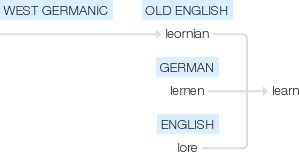Learn
Old English leornian ‘learn’ (in Middle English also ‘teach’), of West Germanic origin; related to German lernen, also to lore1.
wiktionary
From Middle English lernen, from Old English leornian(“to acquire knowledge”), from Proto-West Germanic *liʀnōn. Cognate with German lernen(“to learn”). See also lore.
Possibly related to Middle English leren, from Old English lǣran(“to teach, instruct, indoctrinate”), from Proto-West Germanic *laiʀijan, from Proto-Germanic *laizijaną(“to teach”), from *laizō(“lore, teaching", literally, "track, trace”), from Proto-Indo-European *leys-(“to track, furrow”).
Cognate with Scots lere, leir, Saterland Frisian leere, West Frisian leare, Dutch leren, German lehren, Swedish lära. See also lear, lore. But normally the Middle English word would give lere, not learn.
etymonline
learn (v.)
Old English leornian "to get knowledge, be cultivated; study, read, think about," from Proto-Germanic *lisnojanan (cognates: Old Frisian lernia, Middle Dutch leeren, Dutch leren, Old High German lernen, German lernen "to learn," Gothic lais "I know"), with a base sense of "to follow or find the track," from PIE root *lois- "furrow, track." It is related to German Gleis "track," and to Old English læst "sole of the foot" (see last (n.1)).
From c. 1200 as "to hear of, ascertain." Transitive use (He learned me (how) to read), now considered vulgar (except in reflexive expressions, I learn English), was acceptable from c. 1200 until early 19c. It is preserved in past-participle adjective learned "having knowledge gained by study." Old English also had læran "to teach" (see lere). Related: Learning.
